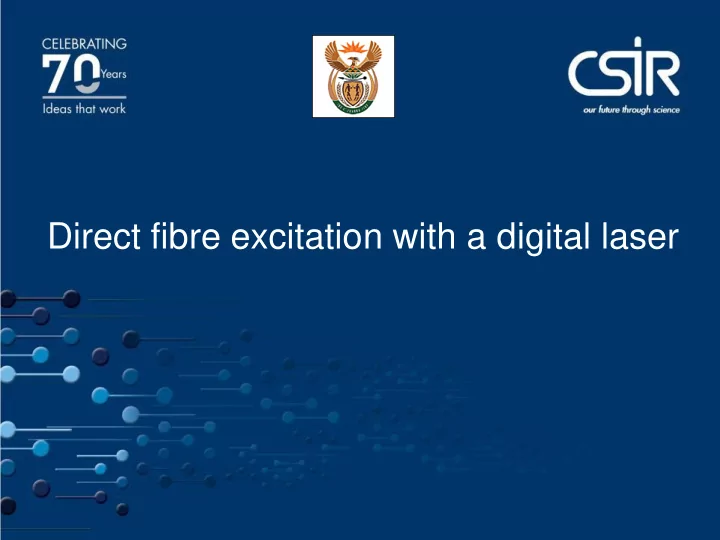

Direct fibre excitation with a digital laser 1
Proof of principle Mode transfer Mode detection Mode source 2
Digital laser resonator as the mode source 3
Digital laser in operation Nd:YAG Monitor 2 SLM Driver CCD PC 2 PC 1 SLM Video signal Monitor 1 time 4
5
Mode transfer - Standard step index fibre 6
Modal detection - Modal decomposition technique 7
We can determine the purity of the petals by azimuthal modal decomposition when using loss lines 0.5 l ± 4 97% 8petals-lines 0.4 0.3 2 | |a 0.2 0.1 0.0 -6 -5 -4 -3 -2 -1 0 1 2 3 4 5 6 8 Azimuthal, l
Generation of Linear Polarised (LP) fibre modes • Digital Holograms: Generate Laguerre Gaussian (LG) Modes from the digital laser • LG modes approximation to Linearly Polarised (LP) modes 9
Injection and transmitted mode through the multimode fibre • Injected modes into a multimode fibre • Emitted modes through a multimode fibre 10
Modal power spectrum – LP 01 Fibre input (Digital laser) Fibre output 11
Modal power spectrum – LP 11 Fibre input (Digital laser) Fibre output 12
Modal power spectrum - LP 21e Fibre input (Digital laser) Fibre output 13
Modal power spectrum – LP 21o Fibre input (Digital laser) Fibre output 14
Control mode coupling of LP 11e and LP 11o • Pre-calibration of the injected mode to achieve a desired outcome. 15
Conclusion • Achieved to generate LP modes from a single source and transmit these modes through an optical fibre with very high efficiency. • Achieved to control cross talk between modes by controlling the mode from the source. • Next step will be to eliminate all telescope and optics that cause aberration effects. • Future work : Test and apply the technology to existing fibre network cable. 16
Thank you Dr Sandile Ngcobo 17 (SNgcobo@csir.co.za)
Recommend
More recommend